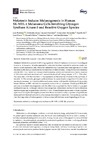Please use this identifier to cite or link to this item:
https://accedacris.ulpgc.es/jspui/handle/10553/73795
| Title: | Melatonin induces melanogenesis in human SK-MEL-1 melanoma cells involving glycogen synthase kinase-3 and reactive oxygen species | Authors: | Perdomo Díaz, Juan Quintana, Carlos González Gordillo,Ignacio Hernández González, Inmaculada Servanda Rubio Sánchez, Sara Loro Ferrer, Juan Francisco Reiter, Russel J. Estévez Rosas, Francisco Jesús Quintana Aguiar, José Martín |
UNESCO Clasification: | 32 Ciencias médicas | Keywords: | GSK-3Β Melanogenesis Melanoma Melatonin SK-MEL-1, et al |
Issue Date: | 2020 | Project: | Evaluación de Endemismos Canarios Como Fuente de Biomoléculas de Interés Medico | Journal: | International Journal of Molecular Sciences | Abstract: | Melatonin is present in all living organisms where it displays a diversity of physiological functions. Attenuation of melanogenesis by melatonin has been reported in some mammals and also in rodent melanoma cells. However, melatonin may also stimulate melanogenesis in human melanoma cells through mechanisms that have not yet been revealed. Using the human melanoma cells SK-MEL-1 as a model, an increase in both tyrosinase activity and melanin was already observed at 24 h after melatonin treatment with maximal levels of both being detected at 72 h. This effect was associated with the induction in the expression of the enzymes involved in the synthesis of melanin. In this scenario, glycogen synthase kinase-3β seems to play a significant function since melatonin decreased its phosphorylation and preincubation with specific inhibitors of this protein kinase (lithium or BIO) reduced the expression and activity of tyrosinase. Blocking of PI3K/AKT pathway stimulated melanogenesis and the effect was suppressed by the inhibitors of glycogen synthase kinase-3β. Although melatonin is a recognized antioxidant, we found that it stimulates reactive oxygen species generation in SK-MEL-1 cells. These chemical species seem to be an important signal in activating the melanogenic process since the antioxidants N-acetyl-L-cysteine and glutathione decreased both the level and activity of tyrosinase stimulated by melatonin. Our results support the view that regulation of melanogenesis involves a cross-talk between several signaling pathways. | URI: | https://accedacris.ulpgc.es/handle/10553/73795 | ISSN: | 1661-6596 | DOI: | 10.3390/ijms21144970 | Source: | International Journal of Molecular Sciences [ISSN 1661-6596], v. 21 (14), 4970, (Julio 2020) |
| Appears in Collections: | Artículos |
SCOPUSTM
Citations
24
checked on Jun 8, 2025
WEB OF SCIENCETM
Citations
22
checked on Jun 8, 2025
Page view(s)
199
checked on Jan 4, 2025
Download(s)
342
checked on Jan 4, 2025
Google ScholarTM
Check
Altmetric
Share
Export metadata
Items in accedaCRIS are protected by copyright, with all rights reserved, unless otherwise indicated.
